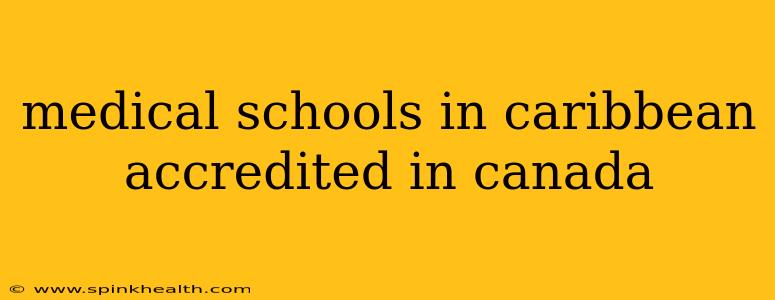Navigating the Path to Becoming a Doctor: Caribbean Medical Schools and Canadian Accreditation
The dream of becoming a physician is a powerful one, and for many, pursuing a medical degree in the Caribbean seems like an appealing alternative. But the path isn't always straightforward. The question of accreditation, especially regarding recognition in Canada, is paramount. This journey begins with understanding the landscape of Caribbean medical schools and how their accreditation impacts your future career in Canada.
My name is Dr. Anya Sharma, and I've spent years advising aspiring physicians on navigating the complexities of international medical education. I've seen firsthand the successes and challenges faced by students choosing this route. This guide will demystify the process and equip you with the information you need to make informed decisions.
What Does Accreditation Mean?
Before we delve into specific schools, let's clarify what accreditation means. Accreditation is essentially a stamp of approval from a recognized body that ensures a medical school meets certain educational standards. These standards cover everything from curriculum quality and faculty qualifications to the resources available to students. Accreditation is crucial because it determines whether your medical degree will be recognized by licensing bodies in the country where you plan to practice.
Are Caribbean Medical Schools Accredited in Canada?
This is where things get nuanced. While many Caribbean medical schools have accreditation from regional bodies like the Caribbean Accreditation Authority for Education in Medicine and other Health Professions (CAAM-HP), this doesn't automatically guarantee recognition in Canada. Canadian licensing bodies, primarily the Medical Council of Canada (MCC), have their own criteria for evaluating medical schools. A school's accreditation in the Caribbean is a necessary step, but not a sufficient one for Canadian recognition.
To practice medicine in Canada, you'll need to successfully complete the MCCQE (Medical Council of Canada Qualifying Examinations), a rigorous series of exams demonstrating competency. The MCC evaluates each medical school individually and decides whether graduates are eligible to sit for these exams. Therefore, the critical question isn't "Is this Caribbean school accredited?", but rather, "Is this Caribbean medical school's degree recognized by the MCC for eligibility to write the MCCQE?".
How to Find Out if a Caribbean Medical School's Degree is Recognized by the MCC?
The best resource is the Medical Council of Canada's official website. They maintain a list of medical schools whose graduates are eligible to write the MCCQE. This list is updated regularly, so always check the most current information. Don't rely on anecdotal evidence or information from unofficial sources.
What are the Challenges Faced by Graduates of Caribbean Medical Schools in Canada?
While some Caribbean medical schools enjoy recognition in Canada, graduates often face challenges:
- Increased competition: The competition for residency positions in Canada is incredibly fierce, and graduates from Caribbean medical schools often face increased pressure.
- Higher cost of education: Tuition at Caribbean medical schools can be significantly higher than at Canadian schools.
- The need for strong preparation: Thorough preparation for the MCCQE is essential, requiring significant effort and dedication.
What are the benefits of studying medicine in the Caribbean?
Despite the challenges, many students choose Caribbean medical schools because of:
- Potentially higher acceptance rate: The acceptance rate can be more forgiving than in highly competitive Canadian schools.
- Experiential learning opportunities: Certain schools provide ample opportunities for clinical rotations in various locations.
- Tropical climate and Caribbean lifestyle: An attractive alternative for those who prefer a warmer climate and different lifestyle.
Choosing a Caribbean medical school requires careful research and consideration of the accreditation status and recognition by the MCC. Thorough due diligence is key to achieving your goal of becoming a physician in Canada. Always consult with the MCC for the most up-to-date and accurate information, and explore your options carefully. Remember, the journey to becoming a physician demands dedication, resilience, and a clear understanding of the path ahead.

